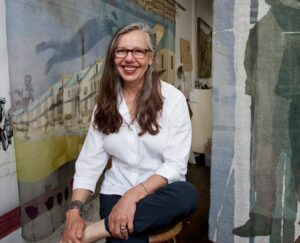

Drop cloths fabricated from textiles are draped behind artist Deborah Baronas. Her exhibition inspired by working-class Americans is opening at the Jamestown Arts Center.
An artist whose installations explore the “spirit, tenacity and hope” of working-class Americans will unveil her exhibition tomorrow to a local audience.
“I make artwork about work,” Deborah Baronas said.
Baronas’ two-month exhibition, “Dropcloths: Tales of a Process,” opens with a free reception from 5:30-7:30 p.m. Friday, Jan. 19, at the Jamestown Arts Center, 18 Valley St. The exhibition, which explores the history of the American laborer, transforms the gallery into a colorful labyrinth of textiles featuring fabric installations that range from 4-12 feet high.
Baronas, who was raised on a New England farm and came of age as a designer in the textile industry, has focused her career on capturing the resilience of labor in the region. Spanning farmers, soldiers, mill workers, enslaved people and domestic servants, “Dropcloths” highlights the intersection of art, history and the artistic practice.
“For over a decade, I have been exploring the lives of workers who came before us and serve as the bedrock of our diverse culture,” she said. “My work is also about heritage. The challenge of moving through changing circumstances without losing touch with the past. The interaction between art and history speaks to people on many levels. One continues to inform the other.”
Baronas said her artwork is visual storytelling, which encourages viewers to delve deeper into the nuances of the creative process. Her intention is to prompt a reexamination of the audience’s surroundings by urging them to recognize the beauty and historical significance embedded in the ordinary.


At the core of the exhibition are drop cloths, emblematic of Baronas’ artistic process. These seemingly accidental byproducts capture both her artistic process and narrative. They serve as a canvas for social commentary and storytelling.
“Based on my own experiences and working-class heritage in farming and textiles, I commenced work on studies of the history of these industries,” she said. “This was inspiration for subsequent work on other industries, as well as systemic societal afflictions such as the opioid crisis and slavery, which have been the focus of my work. Through the work, I discovered my passion for history, recording stories and visually sharing them through immersive sculptural installations.”
Baronas is a graduate of the Rhode Island School of Design who has used site-specific installations to create interactive environments with scrims, paintings, drawings, video, music and photography. She draws inspiration through interviews, site visits, historical research and archival photographs. She said art enables “new narratives to be told about what globalization leaves behind.”
“Sharing common experiences through the visual arts opens doors to conversations about our history, the future and how we fit into the global community,” she said. “My goal is to broaden the scope of my work into a more universal exploration, visually portraying shared stories of cultural and economic change in other cultures, opening doors for conversations that build multinational relationships and understanding.”
Baronas’ work has been displayed across New England, including the Newport Art Museum, the American Textile History Museum in Lowell, Mass., and the Fuller Craft Museum in Brockton, Mass. A past grant recipient of the Rhode Island State Council on the Arts, Baronas has received a commission for a permanent installation in the Rhode Island Veterans Home on Mount Hope Bay in Bristol. Her studio, Baronas Designs, is in Warren.
Following the opening reception, “Dropcloths” will be on display from 11 a.m. to 3 p.m. Wednesdays through Saturdays until March 16. Opening simultaneously in the small gallery is “Centering: Clay and Community.” The exhibition will feature selected work by ceramicists in the center’s artist-in-residency program.
